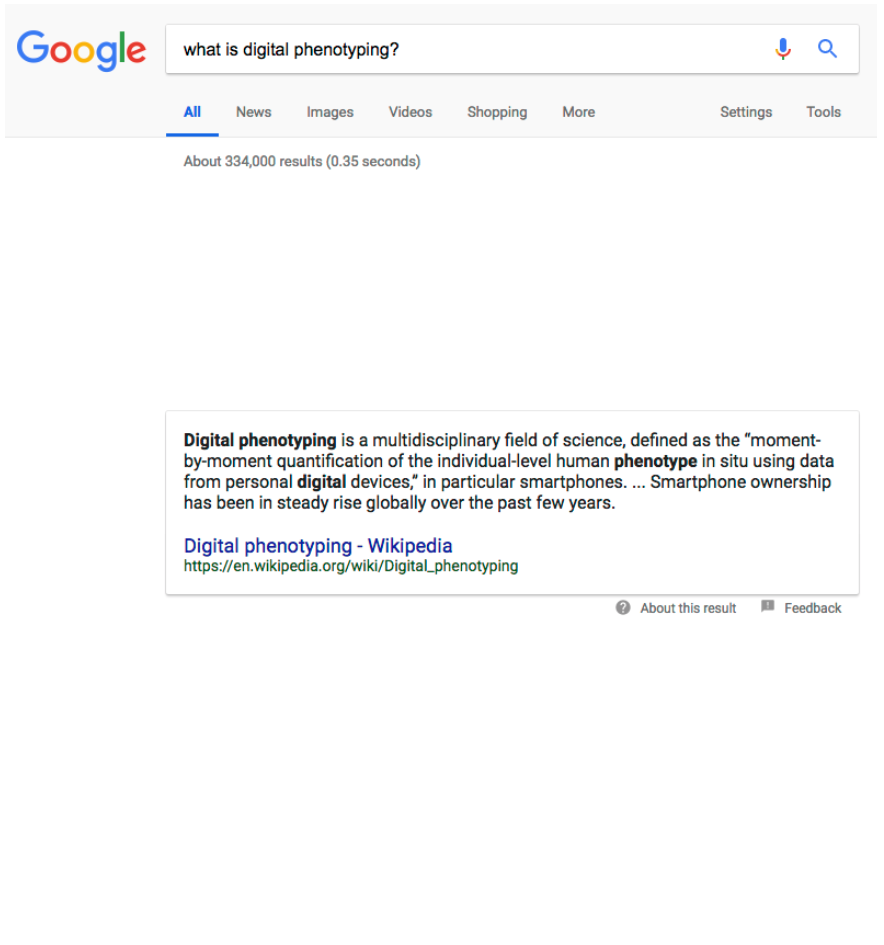Our reliance upon voice-enabled digital assistant platforms such as Amazon’s Alexa and Google Assistant into our digital lives is growing as our adoption rate of these new technologies keeps setting records. One estimate (already a year old) put stand-alone device growth at 130%.
As a digital marketing agency, new opportunities to help our clients amplify their brand messaging are a large part of our daily discussions. Recent reports put the value of shopping via voice search at $40B by 2022 versus today’s value of $2B. Optimizing your content to leverage this new platform represents a huge opportunity.
Before we can get into the finer points of optimizing content for voice search, it’s important to understand the fundamental difference between textual search and voice search. In a typical desktop/mobile search query, the user is given several options to choose from.
Typical Search Engine Results Page:

Imagine if, visually, there was only one option on your screen (where Google decides that a “local pack” is best suited to fulfilling your query, you can get up to three options – still within the confines of a “single result”).
Typical voice “SERP”:

That is the essential difference between voice and textual search. Your voice-enabled assistant doesn’t spew back a string of possible answers (thankfully) but determines the best answer to your query, and then only serves you that answer. More on the implications of that later.
So with this understanding – that you aren’t competing for Page One (of many pages), but for Result One (of One) – what are the search engine ranking factors to be aware of? Backlinko recently published their findings after an in-depth audit of 10,000 voice queries and their corresponding results. Here are some key takeaways:
29 WORDS FROM 2300
Backlinko’s study found that the average length of a voice search answer was 29 words. However, those 29 words bested all others when they came from a section of long-form content, with an average word count of 2312 words. So what can we take away from this? One could infer from this that 1) Google wants succinct answers when fulfilling your voice query – which is what we seek when we ask someone a question, and 2) Google prefers long-form content. The caveat here is that long-form content might be driving this factor simply because long-form content contains more of those 29-word answers than say, a 250-word social post.
FEATURED SNIPPETS
This one just makes sense. Over 40% of all voice search answers came from a Featured Snippet. So if your website/content appears in a Featured Snippet – a.k.a. “Answer Box” – your prevalence in voice search results merits a second look.
DOMAINS > PAGES
This finding is intriguing in that the platform dictates the metrics by which Google selected an answer. As we’ve discussed, you’re getting ONE answer in voice, versus a whole page of answers in textual search. Because of this focus, the thinking is that Google needs to be sure of the source, and thus leans heavily on a source’s Domain Authority (DA) over the specific answer’s Page Authority (PA). In one example, an answer was pulled from The Washington Post, which has a DA of 93, while the specific page referenced only had a PA of 14. Across all 10,000 queries, the DA averaged 76.8 while the PA was 21.1. Were there pages with a higher authority for this query? No doubt. But the DA of this source made Google’s algorithm overrule other sources with a higher PA. What does this mean? That building your site’s overall authority in your area of influence is a key metric for ranking via voice search, which runs counter to current thinking on how Google’s textual search algorithms operate.
SHAREABLE CONTENT
This one also comes from the “of course” pile, albeit indirectly. The average voice search result had 1199 Facebook shares and 44 Tweets. So does this mean that Google is now actively seeking content with high social shares? Not if you take Google at their word. Still, this does indicate that on-message, shareable content (as voted on by your social media adherents) plays a role in your voice search ranking.
PAGE SPEED
Another factor informing what content will be selected as an answer is page speed. This makes sense, as Google wants to avoid any awkward lags in conversation (much like the rest of us in our human-to-human interactions). The same study found that sites where voice results were pulled from averaged 4.6 seconds versus 8.8 seconds for their desktop SERPs. No real surprise here that SEO best-practices, in this metric, also apply to the realm of voice.
So while voice is still a fraction of the overall volume of search traffic, all points indicate huge potential – in the not-too-distant-future – for your brand. With voice search, you have a new platform that:
- behaves differently from textual search
- is riding an ever-increasing wave of adoption
- mimics (and employs) the fundamentals of human interaction
- offers the greatest potential bonus of them all: If you win the fight for that single voice result, your competitors will – at least in the ears of your customers – cease to exist.
If knocking your competition out of the voice arena sounds like a conversation worth having, we’re listening.


